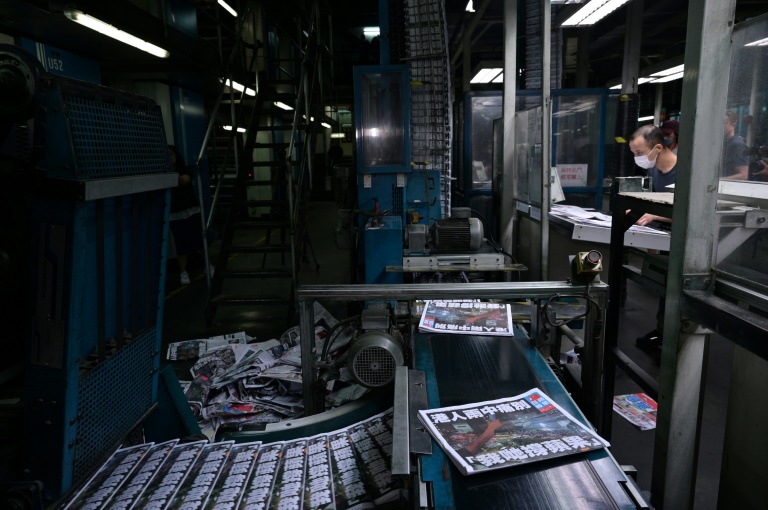As journalists from Hong Kong’s embattled pro-democracy Apple Daily newspaper scrambled to produce their final edition, they didn’t need to go far to find their front page — the news was right outside their doors.
With its confrontational style, caustic commentaries and sometimes tawdry reporting, the city’s most popular tabloid was no stranger to being in the headlines.
So it was perhaps fitting that its final front page after 26 years of operation featured one of its own journalists waving goodbye to hundreds of supporters on the streets outside.
“Hong Kongers bid a painful farewell in the rain: ‘We support Apple Daily’,” the paper’s last headline read.
Apple Daily is the latest Hong Kong institution to be upended by a national security law that Beijing imposed on the city last year to stamp out dissent after huge and often violent democracy protests.
Authorities used the law to freeze its assets and arrest five key executives last week.
Six days later, it folded.
– ‘Complicated feeling’ –
Inside the bustling newsroom on Wednesday evening, many staff wept as they put together the last edition. Others gathered for group photos and cheered.
“We’re trying to do the best at the very last moment,” a harried page designer, who gave his surname as Kwok, told AFP, as a gaggle of reporters from rival outlets criss-crossed the newsroom documenting a watershed moment for their embattled industry.
“It’s a complicated feeling,” he added.
One photographer, who declined to be named, said the newsroom was filled with far more employees than usual on its last night, almost like a reunion or a funeral.
“It was a chance to gather all the colleagues together, we made it a historical moment,” he told AFP.
But he said few had much optimism.
“It doesn’t look good for the future of Hong Kong news, press freedom and the news industry,” he added.
Throughout the evening, a steadily growing crowd of supporters kept vigil outside.
Many chanted slogans or messages of encouragement and shone mobile phone lights towards the building.
Now and then, those inside would come out onto a balcony and wave, replying with their own mobile phone lights.
Transportation worker Alan Tso, 30, said he had been reading Apple Daily for the last 12 years.
He said he sent a box of fresh apples to the company that morning and asked to leave work early after learning the paper would close.
He pinned a three-page hand-written letter to the company’s gates.
“Thank you for standing fast at your posts and reporting news every day for Hong Kongers,” it read.
“Apple Daily stands for the spirit of daring to do what you believe is right,” Tso told AFP. “I won’t buy other newspapers after I lose it.”
– ‘Hong Kong has no future –
A man in a yellow face mask, who gave his surname as Chow, was among four people writing messages on the paper’s main gate.
“I think Hong Kong has no future,” he told AFP.
“We will never have the old Hong Kong again because since the national security law came in, all freedom of press, freedom of expression and freedom of assembly has been suppressed by the government.”
Shortly after midnight, the printing presses began rolling and staff came out to give free copies to the crowds outside.
Many of the supporters were weeping. Others chanted democracy slogans and shook the hands of some of the 1,000 employees now out of work.
In the working-class district of Mongkok, hundreds of Hong Kongers were already queuing around the block in the early hours of Thursday morning to snap up the freshly printed paper.
The first person in the queue for one vendor was a 38-year-old woman who gave her surname as Cheung and said she worked in finance.
She had read the paper for the past two decades, she added.
“I find what happened to Apple in the past few days ridiculous,” she told AFP.
“A media company with good sales and cash reserves is forced to shut down by a government accusing it of being a national security threat and freezing its assets. It feels like I am living under the military regime in Myanmar.”
Back at the headquarters, one Apple Daily photographer, who asked not to be named but said he joined when the paper first opened in 1995, had spent some of the evening watching and taking pictures of the crowds below.
His eyes were red.
Asked what he would do next, he simply shrugged.
“I just have to stop. No more.”










